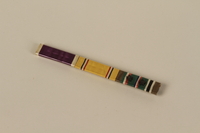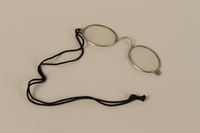Overview
- Brief Narrative
- Prisoner of war (POW) tag issued to 24 year-old Bernard Kupferman after he was captured and imprisoned by the Germans on September 5, 1944. Bernard was a sergeant in the 60th Infantry Regiment, 9th Infantry Division, United States Army. While crossing the Meuse River in Belgium, Bernard and his battalion were attacked and captured. He was wounded and imprisoned in Stalag IIIC in Kustrin, Germany, and liberated by Soviet forces in January 1945. He and a group of fellow prisoners walked from Kustrin to Poland and then to the Ukraine, where a high ranking U.S. Army officer heard about the soldiers. He arranged for them to be taken to a resort. In March/ April, following their recuperation, they were shipped home to the United States.
- Date
-
use:
1944-1945
- Geography
-
issue:
Stalag IIIC;
Kustrin (Germany)
- Credit Line
- United States Holocaust Memorial Museum Collection, Gift of Bernard and Sylvia Kupferman
- Contributor
-
Subject:
Bernard Kupferman
- Biography
-
Bernard Kupferman (1921-2008) was born in the Bronx section of New York City. He joined the Army in 1940 and was stationed with the 16th Infantry Regiment on Governor’s Island, New York. A few months later he was shipped to Germany as a sergeant in the 60th Infantry Regiment, 9th Infantry Division. He landed in France on D-Day, June 6, 1944. He was wounded June 16 but recovered and rejoined his unit. On September 5, 1944, the Germans bombed Bernard’s outfit as they crossed the Meuse River in Belgium. Bernard was wounded, captured, and forced on a three day march to a temporary labor camp. As a non-commissioned officer he did not have to work, but the Germans subjected him to hours of interrogation. He revealed nothing except his name, rank, and serial number. Next, the Germans forced their prisoners on another three day march, stopping once to provide them with a small box of food and water. They were crowded into boxcars for a three day train ride to camp 12A in Lindenberg, Germany, where they stayed for a week before the Germans transferred them to their final destination, Stalag IIIC in Kustrin, Germany. Food at the camp consisted of a fifth of a loaf of black bread and bean or rutabaga soup filled with bugs. Not able to eat the food provided, Bernard made soup from the grass growing along the camp fence. The American Red Cross sent care packages every three weeks and these packages, containing spam, coffee, biscuits, and cigarettes, kept Bernard alive. He did not smoke and traded the cigarettes for bread.
A Russian armored division liberated the camp on January 31, 1945. The Russians told the American that they could not help them as they were driving west into Germany. They left the Americans on the side of the road without food, water, or weapons and with the advice to walk in the opposite direction. Bernard and ten others walked to a farmhouse, where they ate well, got clean, and left two days later for the Polish border. On February 27, 1945, he met a group of Jewish Holocaust survivors in Łódź, Poland, who gave him a siddur (prayer book) with their names inside because they wanted to be remembered. From Poland, the Americans traveled to the Ukraine where a high ranking U.S. Army officer in Moscow heard about their arrival and had them relocated to a resort area. They stayed there until heading to Odessa, U.S.S.R. in March 1945, where they were put on a ship to Naples, Italy, then back to the U.S. in April.
Bernard was discharged shortly after returning home. He was awarded three Purple Hearts, a Bronze Star, an American Defense Medal, and a European/African/Middle Eastern Campaign Medal. He learned the printing trade and worked as a pressman in New York City where he married Sylvia in 1947. In 1966 they moved to Maryland and Bernard worked at the Government Printing Office until his retirement. Sylvia and Bernard had two daughters.
Physical Details
- Classification
-
Identifying Artifacts
- Category
-
Labels
- Object Type
-
Name tags (lcsh)
- Physical Description
- Rectangular, silver colored, metal identification tag with holes punched in 3 corners. It is perforated horizontally across the center. Identical text is stamped on both sides of the perforation.
- Dimensions
- overall: Height: 1.625 inches (4.128 cm) | Width: 2.375 inches (6.032 cm)
- Materials
- overall : metal
- Inscription
- front, top, stamped : ST.-XII A / 87277
front, bottom, stamped (in reverse image from above) : ST.-XII A / 87277
Rights & Restrictions
- Conditions on Access
- No restrictions on access
- Conditions on Use
- No restrictions on use
Keywords & Subjects
Administrative Notes
- Legal Status
- Permanent Collection
- Provenance
- The POW identification tag was donated to the United States Holocaust Memorial Museum in 2007 by Bernard and Sylvia Kupferman.
- Record last modified:
- 2024-02-21 07:11:17
- This page:
- http://collections.ushmm.org/search/catalog/irn34851
Download & Licensing
In-Person Research
- By Appointment
- Request 21 Days in Advance of Visit
- Plan a Research Visit
- Request to See This Object
Contact Us
Also in Bernard Kupferman collection
The collection consists of artifacts: a POW tag, a pince-nez, and a ribbon bar, correspondence, documents, and publications relating to the experiences of Bernard Kupferman during and after World War II as a soldier in the United States Army including when he was held as a prisoner of war of Germany.
Date: 1944-1945

Military ribbon bar awarded to a Jewish American soldier
Object
Ribbon bar issued to 24 year-old Bernard Kupferman, a sergeant in the 60th Infantry Regiment, 9th Infantry Division, United States Army. The ribbons represent the following awards: Purple Heart, American Defense Medal, and European/African/Middle Eastern Campaign Medal. While crossing the Meuse River in Belgium on September 5, 1944, Bernard and his battalion were attacked and captured by the Germans. Bernard was wounded and imprisoned in Stalag IIIC in Kustrin, Germany, and liberated by Soviet forces in January 1945. He and a group of fellow prisoners walked from Kustrin to Poland and then to the Ukraine. When a high ranking U.S. Army officer heard about the soldiers, he arranged for them to be taken to a resort area. In March/April, following their recuperation, they were shipped home to the United States.

Pince-nez with black cord given to a Jewish American soldier by survivors of the Łódź ghetto
Object
Clip-on eyeglasses given to 24 year-old Bernard Kupferman, a Jewish American soldier, by a Polish Jew named Edward, whom he met in Łódź, Poland, on February 17, 1945. Bernard was recently liberated from a German prisoner-of-war (POW) camp and was walking through Poland with a group of fellow former POWs trying to find a way home. They met Edward and a group of Jewish survivors of the Łódź ghetto who gave Bernard a siddur, a Jewish prayer book, that had the names of the group members inscribed in the back. The book also contained a pair of pince-nez glasses that had belonged to a female associate who had been killed by the Germans. The group met regularly to share information and gave the siddur to Bernard because they wanted to be remembered. The Łódź ghetto was destroyed by the Germans in the spring of 1944 and all the inhabitants had been deported to concentration camps. Bernard was a sergeant in the 60th Infantry Regiment, 9th Infantry Division of the United States Army. While crossing the Meuse River in Belgium on September 5, 1944, Bernard and his battalion were attacked and he was wounded and captured by the Germans. He was imprisoned in Stalag IIIC in Kustrin, Germany, and liberated by Soviet forces in January 1945. He and his fellow prisoners walked from Kustrin to Poland, and then to the Ukraine. A high ranking U.S. Army officer heard about the soldiers and arranged for them to be taken to a resort. In March/April, following their recuperation, they were sent home to the United States.
Bernard and Sylvia Kupferman papers
Document
Documents, correspondence, and envelopes documenting Bernard Kupferman's release and journey home from Odessa, USSR.
Prayer book
Object
Siddur received by 24 year old Bernard Kupferman from Holocaust survivors in Łódź, Poland, on February 17, 1945, after his release from a German prisoner of war camp, Stalag IIIC, on his way to the US military mission in Moscow. Bernard was a sergeant in the 60th Infantry Regiment, 9th Infantry Division, United States Army. While crossing the Meuse River in Belgium, Bernard and his battalion were attacked and captured on September 5, 1944. He was wounded and imprisoned in Stalag IIIC in Kustrin, Germany, and liberated by Soviet forces in January 1945. He and a group of fellow prisoners walked from Kustrin to Poland and then to the Ukraine, where a high ranking U.S. Army officer heard about the soldiers. He arranged for them to be taken to a resort. In March/ April, following their recuperation, they were shipped home to the United States.



